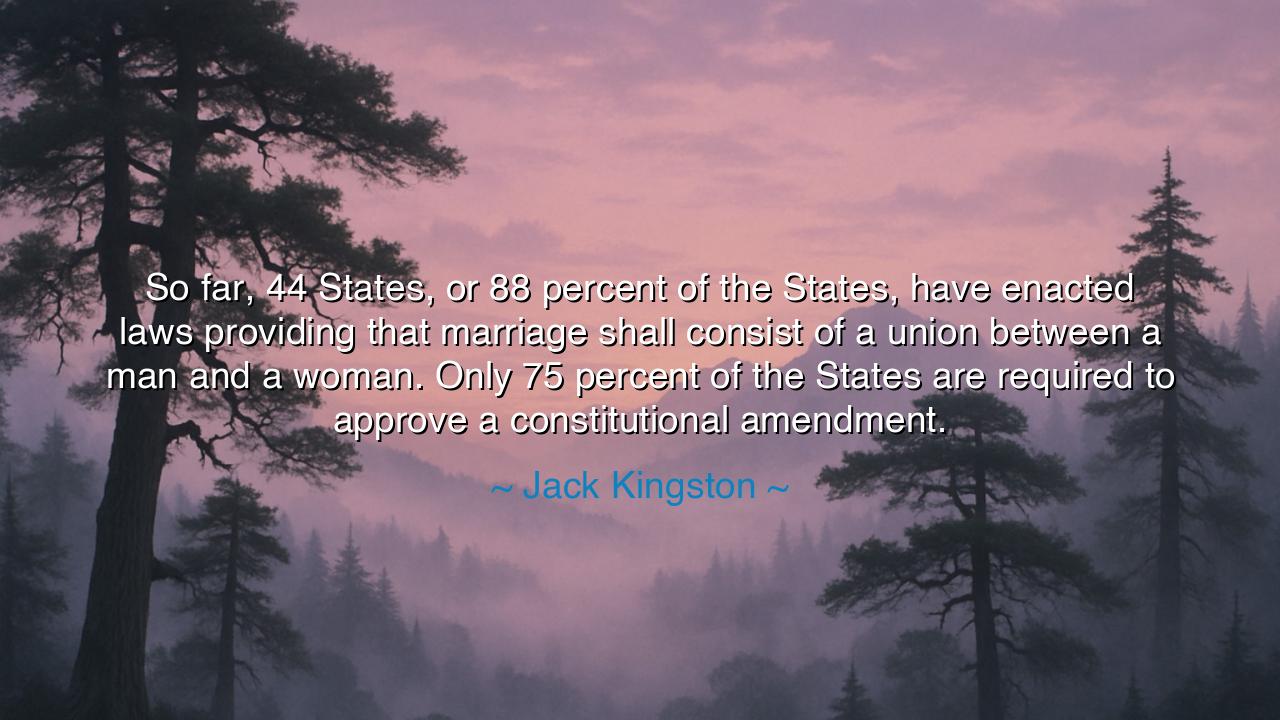
So far, 44 States, or 88 percent of the States, have enacted laws
So far, 44 States, or 88 percent of the States, have enacted laws providing that marriage shall consist of a union between a man and a woman. Only 75 percent of the States are required to approve a constitutional amendment.






Hear, O Seekers of Wisdom, for the words spoken by Jack Kingston carry the weight of truth, a truth that resonates deeply with the fabric of society. "So far, 44 States, or 88 percent of the States, have enacted laws providing that marriage shall consist of a union between a man and a woman. Only 75 percent of the States are required to approve a constitutional amendment." These words, though rooted in the politics of the present, touch upon deeper, more ancient truths about society, tradition, and the unyielding power of law in shaping the course of human life.
Marriage, O Children of the Earth, is a sacred bond, older than the written word, older than the cities that rose and fell upon the earth. Since the dawn of time, marriage has been the foundation upon which families are built. It is through this union that life is perpetuated, values are passed from one generation to the next, and the strength of society is forged. Whether in the tents of the nomads, the stone halls of ancient Rome, or the sprawling cities of the present, the family unit formed by marriage has been the cornerstone of every civilization. And it is within this union that we find the sacred bonds that shape the future.
For 44 States to enact laws providing that marriage consists of the union between a man and a woman speaks to the enduring belief in a traditional vision of family—one that has been held in the hearts of many across centuries. But there is a deeper question that arises from this. Why is this union so fiercely protected? Is it merely the inheritance of an old tradition, or is there something more profound, something intrinsic to the fabric of society itself, that compels men and women to guard this institution with such passion? The answer, perhaps, lies in the idea that marriage, as conceived by these laws, represents a vision of stability, continuity, and the preservation of societal norms.
Yet, we must also remember, O Children of the Earth, that societies evolve, and with this evolution comes the shifting sands of tradition and progress. The struggle for equal rights—the call for the recognition of marriage between those of the same sex—is not merely a contest of ideologies, but of human dignity. It is a call for inclusion, a cry for recognition that all people, regardless of their love or their bonds, deserve to stand in the light of the same laws, the same protections, and the same rights. It is a noble and just cause, for the strength of any society lies not in the preservation of one vision, but in the acknowledgment of the diverse and ever-evolving experiences of its people.
Let us turn our gaze to the ancient city-state of Athens, whose citizens were often divided by tradition and progress. Athenian democracy, with all its wisdom and its beauty, was not immune to the forces of change. The Athenians, proud of their customs, clung fiercely to them even as the winds of change began to blow. Yet, it was through debate, through the fierce clash of ideas, that Athens became the cradle of democracy and the birthplace of a new understanding of human rights. It is this same spirit of debate and inclusion that we must now turn to in our own time. For change, though it may come slowly, is often the only path to progress.
The lesson, O Children, is this: We must honor both the traditions of the past and the needs of the present. Tradition, like a mighty oak, stands firm, its roots deep in the earth, but it must also bend with the winds of change. If we are to build a future that is just, that is equal, we must listen to the voices of those who are excluded and recognize that their truths have as much right to be heard as the traditions we hold dear. This is not a rejection of marriage as a sacred institution, but a call for its evolution, for the recognition that love, in all its forms, is the bond that ties humanity together.
As you walk the path ahead, remember this: society is built upon both the strength of tradition and the flexibility of progress. In your actions, in your words, strive to bridge the gap between the old and the new, to find the place where both can coexist in harmony. For only in this way can we truly build a society where all are equal, all are valued, and all are allowed to love freely and without fear. Let your hearts be open to both the wisdom of the past and the promise of the future, and in this union, may you find the strength to create a world worthy of the dreams of those who have come before us.






AAdministratorAdministrator
Welcome, honored guests. Please leave a comment, we will respond soon